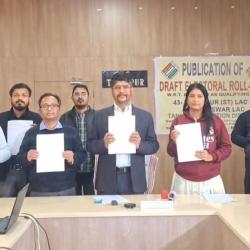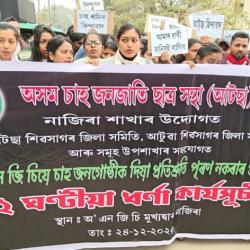Tobacco advertisements of Philip Morris' brands removed as per law
Activists to go to court for legal action against Godfrey Phillips
The point-of-sale tobacco advertisements that were violating the Indian tobacco control Act in Goa, India, were removed by the evening of 16 January 2008.
In the lead up to the removal of these advertisements, activists and media had reported that the advertisements of a cigarette brand of world's largest tobacco company - Philip Morris' Indian subsidiary were blatantly violating 'The Cigarette and Other Tobacco Products Act 2003" and the rulings for the point-of-sale tobacco advertising.
Clearly due to the mounting pressure, these tobacco advertisements were removed by last evening.
"I'm extremely happy that the advertisement boards were removed! But we cannot take these violations lying down! I'm moving the local court against the Godfrey Phillips [Indian subsidiary of Philip Morris], the dealers and the kiosk owners" said
Dr Shekhar Salkar, General Secretary of National Organization for Tobacco Eradication (NOTE India). "All the activists must watch for any violation and book these irresponsible industrialists".
The rulings for point-of-sale tobacco advertising in accordance with 'The Cigarettes and Other Tobacco Products (Prohibition of Advertisement and Regulation of Trade and Commerce, Production, Supply and Distribution) Act, 2003', envisage stringent and immediate action by the State Government against advertisement of smoking and other tobacco products.
The rules clearly mention that on point-of-sale of tobacco products, only the kind of tobacco product being sold should be mentioned, and no brand name, or any other promotional message or picture is permitted under the Indian law.
But the tobacco advertisements boards in Goa were violating this law. "This advertisement is, at the onset, reckless contempt of the law" had said Dr Salkar, in a letter addressed to the Indian subsidiary of Philip Morris demanding an unconditional apology for this gross violation and disregard to public health.
"The Act does not allow display of pictures at the point of sale of tobacco products, which has been done [pictures were displayed earlier] in the advertising board placed at a kiosk in Panaji near Hotel Lucky, opposite Municipal garden and kiosk below D. V. talaulikar hospital, Khalap Mension, Vasco,Goa. The law states that, at a point of sale of cigarettes, the boards shall contain only the words: - 'Cigarettes are sold here'" had reported Dr Salkar.
Although the rulings of the tobacco control Act mentions stringent and immediate action by the state government against such violations, it is yet to be seen how urgently and stringently will the government act to protect public health from the tobacco industry interference.
Other Contents by Author
More than 300 million people around the world have asthma, and the disease imposes a heavy burden on individuals, families, and societies.The Global Burden of Asthma Report, indicates that asthma control often falls short and there are many barriers to asthma control around the world. Proper long-term management of asthma will permit most patients to achieve good control of their disease. Yet in many regions around the world, this goal is often not met.Poor asthma control is also seen in the lifestyle limitations experienced by some people with asthma. For example, in some regions, up to one in four children with asthma is unable to attend school regularly because of poor asthma control....
After ten hearings at the Uttar Pradesh (UP) State Information Commission and 1.5 years from first filing the Right to Information (RTI) application to seek documents related to National Rural Employment Guarantee Scheme (NREGS) in Miyaganj block of Unnao district in UP, the people of Miyaganj are finally relieved to get those documents pertinent to the NREGS work done in their block. The RTI application asking for information (like muster rolls and measurement books) under the RTI Act, 2005, was filed on 4 December 2006 by Miyaganj block resident Yeshwant Rao at the local Block office. He received a reply after more than six months (June 2007) asking him to submit Rs. 1,58,400 (at...
Malaria, a disease without borders, is preventable and treatable however it needs a bolder commitment from donors and member states if it is to be brought under control. Malaria remains a major health problem in the South-East Asia region with 83% of its population at risks. There are an estimated 20 million cases and 100,000 deaths each year from malaria in the region."Today we have powerful new tools and effective models of control, which is critical in our approach in tackling this disease. But financial resources need to be mobilised and political commitment to addressing this disease needs to be solidified. A lackadaisical attitude to this health issue will not lessen the current...
"The National Human Rights Commission (NHRC) must take immediate cognizance of the violations in Nandigram and recommend stringent penal action against all those involved, including instituting an inquiry into the involvement of the CPI (M) leadership and cadres in the planning/abetment/execution of the crimes committed" demanded firebrand activist and leader of National Alliance of People's Movements (NAPM) Medha Patkar. "The National Commission for Women must immediately constitute a fact-finding delegation that must visit Nandigram and submit its Report to the NHRC and also direct immediate payment of compensation to all the women raped and all others injured" further...
"We will seek justice in the honourable High Court of Bombay" said Dr Shekhar Salkar, General Secretary of National Organization for Tobacco Eradication (NOTE). "Mr.Amitabh Bachchan was clearly shown smoking a cigar [in 'Family' film] in all the display-hoardings prominently. This amounts to clear and unambiguous breach of the law prevalent within the state and the country. However the session court did not appreciate the view of NOTE India, thereby absolving the respondents of the charges" added Dr Salkar. In March 2008, the Sessions Judge, North Goa, Mr U V Bakre had quashed the legal proceeding against Amitabh Bachchan, chairman of Amitabh Bachchan Corporation Limited (...
"One of the biggest dilemmas the prison administration is facing today is whether to ban the use of tobacco in all forms in the prison or not" according to ST Ramesh, Additional Director General of Police in Karnataka who is also the Inspector General (Prisons)."In any case, the enforcement of tobacco ban in prisons is going to be an uphill task!" he further adds.Tobacco use inside jail in India and other countries has been alarming. Many jails have even reported use of injecting-drug-use among their inmates. It raises serious concerns on the extent to which such living conditions which make these jails a 'correction facility' for its inmates.Recently earlier in April 2008...
The World Health Day this year (7 April 2008) focuses on the need to protect health from the adverse effects of climate change. The theme "protecting health from climate change" puts health at the centre of the global dialogue about climate change. The World Health Organization (WHO) selected this theme for the World Health Day in recognition that climate change is posing ever growing threats to global public health security. The appalling conditions of health responses during civil unrest, violence and natural calamities like floods in India are well-documented. Also the disease outbreaks, especially water-borne diseases, have been posing an enormous challenge in such situations...
This World Tuberculosis (TB) Day (24 March) is another opportunity for people of India to review their TB responses. Drug susceptible TB is treatable, curable and with proper programme interventions, it is possible to believe in the theme of World TB Day: 'I can stop TB'. Can we say the same for drug-resistant TB? Drug-resistant TB has been recorded in the world at the highest levels ever according to the World Health Organization (WHO) report (Anti-Tuberculosis Drug Resistance in the World, February 2008). DOTS (directly-observed treatment short-course), is the internationally recommended TB control strategy that includes standardized case detection, treatment and patient support. It...
How will India and other countries in the world achieve the millennium development goal (MDG) target to reduce by half the proportion of 2.6 billion people who have no access to basic sanitation by 2015? On this year's World Water Day (22 March 2008), to put the spotlight on sanitation the United Nations General Assembly declared the year 2008 as the International Year of Sanitation. The goal is to raise awareness and to accelerate progress towards the MDG targets to halve the number of people without access to basic sanitation by 2015. Where is the estimated US$ 10 billion annual cost to achieve this MDG target by 2015 going to come from? From 2008-2015, we will need US$ 80...
Negotiations toward a protocol on illicit tobacco trade to the global tobacco treaty, formally known as the World Health Organization Framework Convention on Tobacco Control (WHO FCTC), were held earlier this month. The illicit tobacco trade makes up approximately 10 percent of global tobacco sales and costs governments between 40-50 billion dollars (27-34 billion euros) every year. "Transnational companies benefit in a number of ways from the illicit trade in tobacco," said Kathyrn Mulvey, Director of International Policy, Corporate Accountability International (CAI). While many countries voiced their commitment to a protocol that will require tobacco corporations to assume...










Add new comment